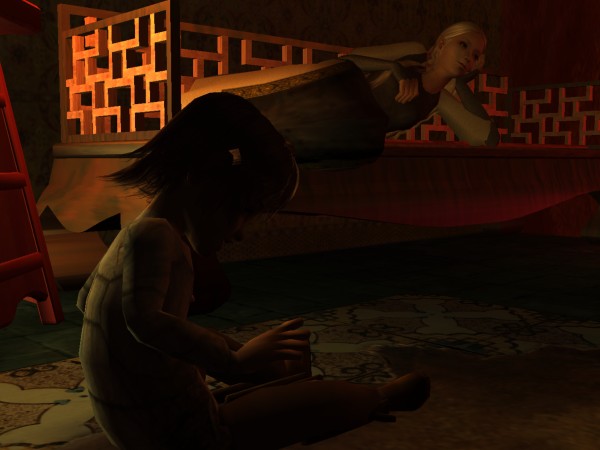
Sina’s earliest memory was of another memory.
A tiny, cotton-haired thing she had been then, all bundled up in skins until only her little catkin head peeked out beneath her daddy’s chin, looking like the pussy willows that were his pet name for her. Every spring her father cut and carried pussy willow branches down into the darkness for her, but little Sina had never seen snow.
“White stuff that falls down from the sky,” her father must have explained to her when she had wondered about this snow-word that sometimes came up in his songs. But she did not remember that.
Her first memory was of coming up out of the cave—of going into that fearful Outside from which some elves never returned—and being bluntly disappointed.
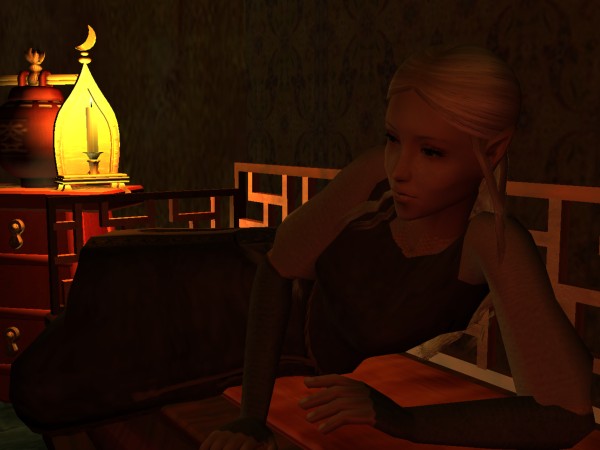
The snow was dark and dead like ash. It lay wet and heavy over everything like a sodden diaper, and stifled every echoing sound. But the sky was the iridescent blue-black of a blow-fly, and its high dome was speckled with a thousand thousand glittering stars—out of reach forever.
She did not remember it now, but her father must have taken her out in some other season to give her a glimpse of the night sky—for little Sina had long cherished the belief that the white stuff that fell down from the sky was stars.
She had learned two lessons that night, and she remembered them still. The first, though she had learned it young, was one all elves came to by and by: that nothing was likely to be as beautiful as she had imagined it to be. From early on that knowledge had blunted life’s many disappointments for her.
The second was her secret, and one even her sisters did not seem to know: that there was no sight sadder than her daddy’s face when she failed to find pleasure in something he had thought would make her glad.

Tonight he came in singing a winter journeysong from a time long past, when elves were still free to go tramping about in knee-deep snow, unafraid to leave their tracks behind. Even in his earliest memories her father had never known such a time, but he sang to be sure their people would never forget.
He sang more softly as soon as he opened her door, and he was all but humming by the time he stepped around the curtain, having guessed Lasim was sleeping. She trotted up to meet him before he had a chance to look at the floor.
“Daddy!”
He hugged her with one arm and kissed her hair, clucking in delight like an old hen.
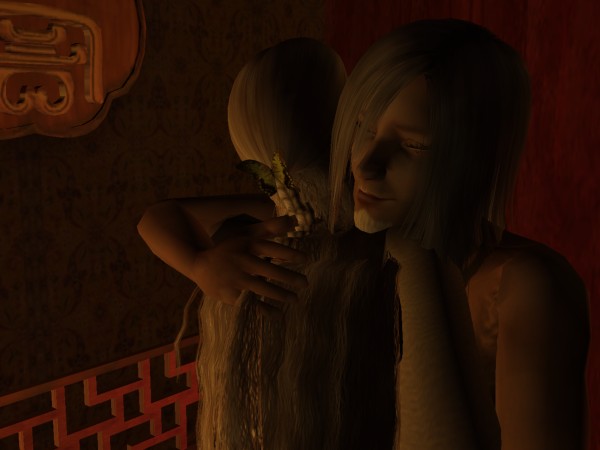
“Mmm, you smell like cabbage soup!” he said. “Got any left?”
He only smelled like smoke.
“No,” she scolded, “you can just go home and ask Mimi what she made.”
“She won’t give me any since I was late,” he cackled. “I’ll just have to eat you instead!”
He squeezed her again and gave her a smacking kiss on the cheek. His upper lip was sweaty, but Sina pretended not to care.
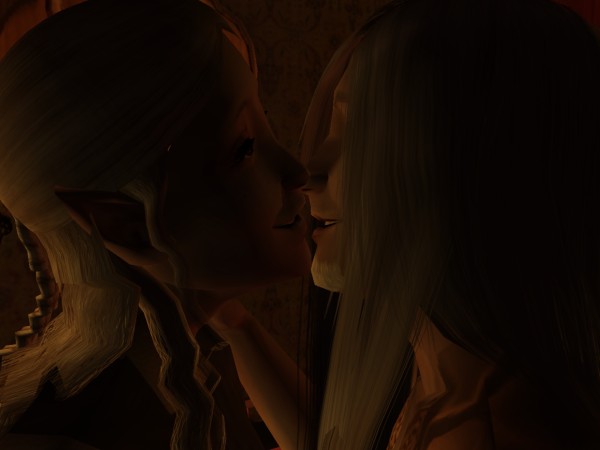
“And have Sim for dessert!” he added. “Where is he?”
He looked down. Sina tried to dodge before his eyes and wished herself a little wider, but she could tell by his sudden scowl that he had seen.
“What’s he doing here?” he growled.
Lasim snored noisily on the rug, but Seven seemed to be holding his breath.
Sina began, “Now, they were just playing—”

“Sim doesn’t look like he’s playing to me.”
“Well, they were, and Seven is such a good, quiet boy and knows just how to play with a little boy like Sim—”
“What are you doing with him?” her father interrupted. “That’s supposed to be old Elara’s job.”
Sina winced, but her father was staring stonily at Seven and did not see.
“Well, she has a bit of the cough…”
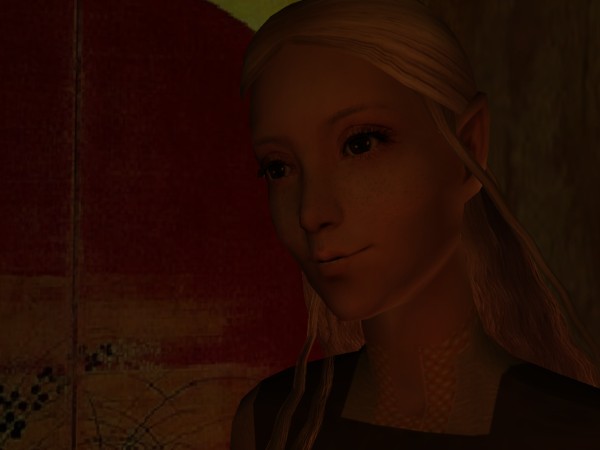
“Oh, right!” he snapped.
“Shh!”
“Oh, right!” he whispered. “Elara has the cough, so you bring the kid she’s been coughing on over here to play with Sim!”
“I don’t have the cough,” Seven said softly. Sina’s father did not acknowledge him.
“Every other time I see this kid he’s running around with snot dripping down his face—”
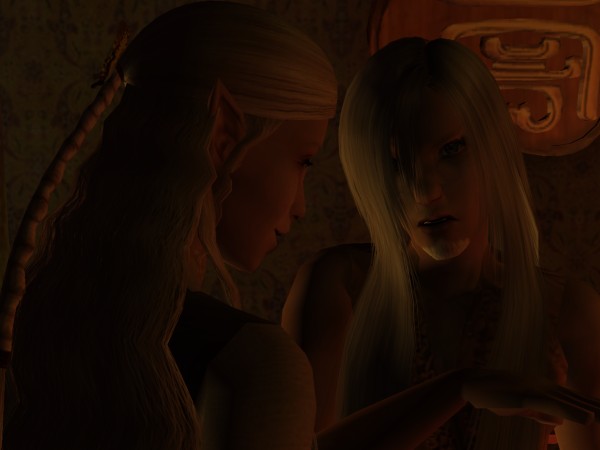
“Well, he isn’t now,” Sina said with gentle patience. “What’s that?” she asked, running her fingers down his dangling arm to his hand, in the hope of distracting him. “For Mimi?”
He stood tall and held the flask of gray water proudly up to the light. “For you, silly!” he grinned. “If I go and give your mother the strength of seven elves she’ll just use it to break crockery over my head. And we need that crockery,” he winked.

Sina laughed. “And your head!”
She took the flask and grinned as proudly at it as he did, though her stomach was already tightening with nausea at the thought of drinking the noxious potion.

The water from the elves’ pipe was an honor reserved for those few fortunate ladies who had husbands to bring it to them, and the effects it was supposed to produce were becoming legendary in proportion as each lady tried to outdo the others in the telling of the tales.
Sina had never pretended it made her feel anything it did not—other than gratitude—but in the queasy mornings-after she had foggy memories of half-sleeping through nights that had seemed endless, lying spread-eagled and sweaty and moaning in misery.
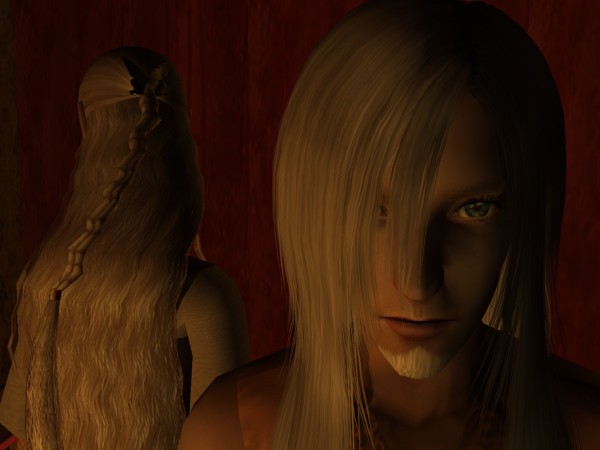
When she had still shared her bed it must have appeared enough like passionate desire to have aroused her husband. She had memories of a strange sense of immateriality when he crushed her, as if he eclipsed her body with his: there were only her hands and feet drifting off, attached by mere threads, and Llosh pounding away at her as if he meant to anchor them with a spike driven into the bed.
He rarely showed her such interest when she lay down prim and undrugged beside him. The husband her daddy had gotten for her had loved another girl.

From the kitchen she heard her father ask gruffly, “What are you playing there, kid?”
Sina lifted the bottle onto the highest shelf and stopped to listen.
Seven mumbled, “Building a bridge with my sticks.”
“A bridge to where?” her father asked.
“Between my knees.”
Her father laughed sharply. “Get a lot of traffic going that way, do you? Trying to keep someone from going the long way around? What happened to your chin?”
Sina hurried back.
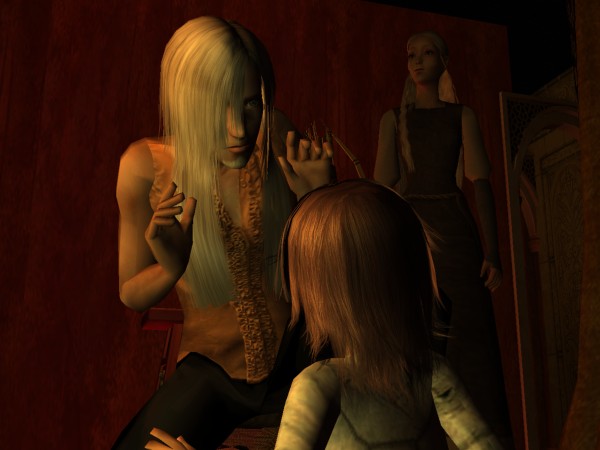
“He just took a little tumble…” she said soothingly.
Seven corrected, “I got pushed.”
“So why didn’t you push back?” her father asked. “You got to learn to stick up for yourself, kid.”
“Now, it wasn’t a fight or anything like that…” Sina said.
Seven grumbled, “It was intentional.”
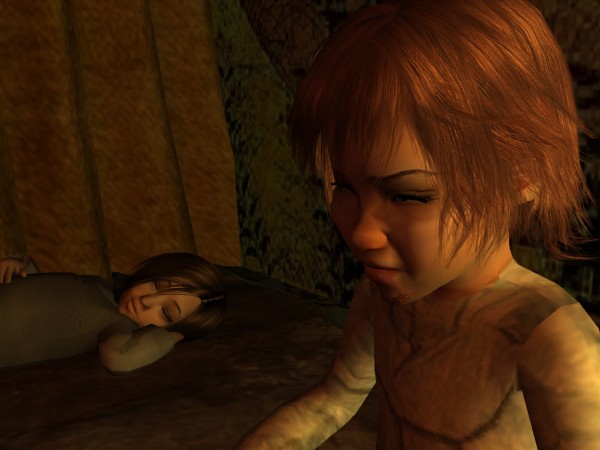
“Intentional!” Her father stood up and brushed off his hands, laughing. “Stinking Mother! Listen to the kid! Intentional! Shit! Who’s been teaching you those big words? You keep talking smart like that and no wonder the kids are going to push you down!”

For the second time Sina hurried to bring up something distasteful to herself in an attempt to distract her father.
“Who did you see tonight?” she asked. “Was Khoww there?”
Her father grunted. He still did not look away from the little boy.
Sina took a fortifying breath and asked, “Did he say when he was coming?”
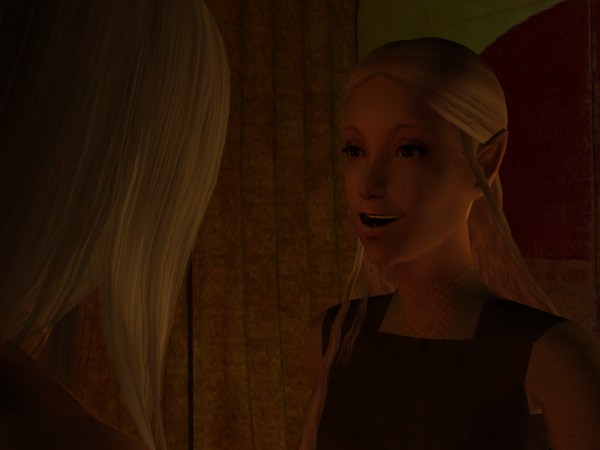
Oh, if it was tonight! If he had been smoking! If that was why her father had brought her the water! Being half-conscious while a strange elf bore down on her body seemed more horrifying than being awake, even if she would remember less of it in later times.
“He isn’t coming,” her father muttered.
Sina made a cheeping gasp, like a startled pigeon. Her father stared at Seven.

“…tonight?” she concluded for him.
“He isn’t coming.” He pushed back a long lock of hair and rubbed his hand down his face, wiping the sweat of his forehead and upper lip down into his beard.
“Ri, then?” she quavered.
“Nobody’s coming,” he said gruffly. At last he looked at her. “You didn’t want him to, did you, Sisi?”
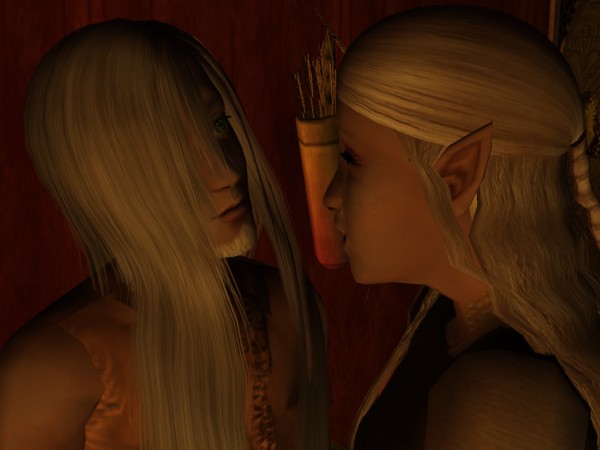
Sina did not stop to ask herself what she had wanted, though she would have known in an instant if she had. She only wondered what her father wanted. Her lip trembled with hesitation. What if she guessed wrong?
Finally she shook her head so slightly that she could have denied the gesture if he had seemed disappointed.
Instead he pulled her close and leaned his cheek upon her shoulder. “You don’t want that, Kittykins,” he assured her. “Not my girl.”
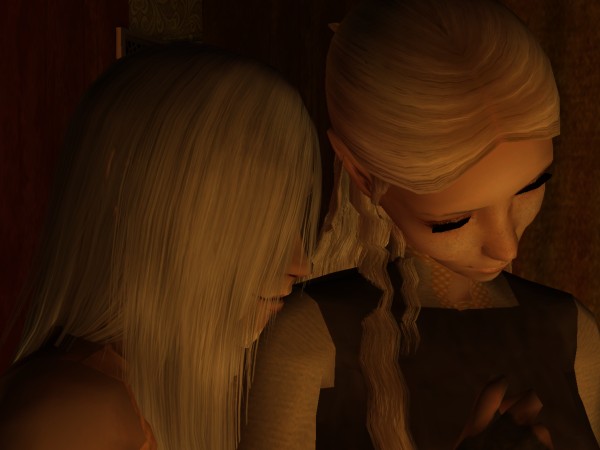
Sina had one sweet instant of relief before she realized what this would mean for her. The other girls were already rallied against her because with her private apartment and her private meals—and with the pipe water, had they known—she continued to enjoy the prerogatives of a wife while all the other widows had sunk back to the state of unmarried girls.

Her one remaining act of provocation would be a refusal of the duty they all shared: to bear children—to their husbands, if they were of the fortunate few who had them, or to whatever elf wanted them, or to whomever was sent to them if they were not even desired.
She knew her father loved her and only wanted to make her glad. If he wanted to inflict this upon her it meant he simply did not know.
In a singular act of defiance she reminded him, “But I don’t have a husband…”
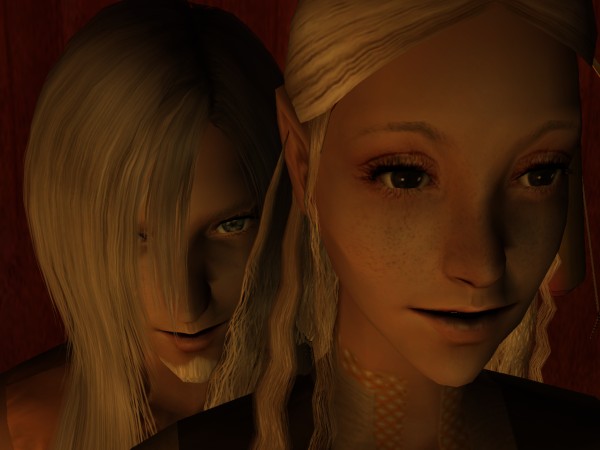
“Let me take care of that, Sisi,” her father murmured.
Sina did not understand. She whispered, “What do you mean?”
“I’ll get you one, baby.”
Sina laughed at the absurdity of the idea. Oh, but Llen’s son had seen thirteen winters—she hoped that was not what he meant. Then she had another idea.
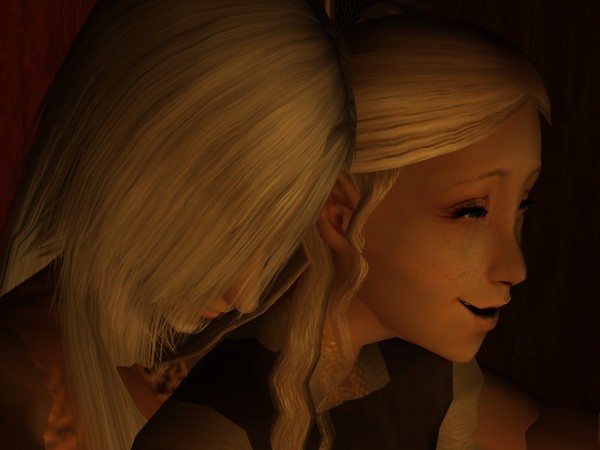
“Are you going to free some of the slaves?” she whispered.
It had happened on occasion—Val and Desh had come to them that way, and even the noble elf Teodru—all dead now. Though they could not have known it, those few males surviving in servitude occupied the fantasies and dreams of an entire generation of elven girls.
“One way or another, I’ll get you one,” he promised.
“But how else—”
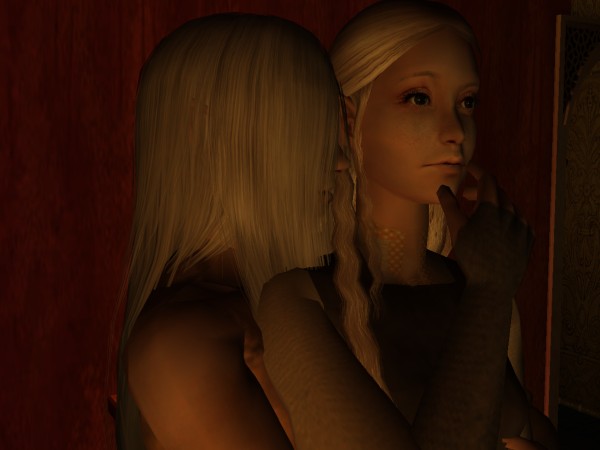
“Let Daddy take care of that, sweetheart,” he whispered. “You just take care of yourself and Sim.”
He was silent for a moment, and Sina leaned cozily back against his chest, though the top of her cottony head had long since grown up above the height of his. Then she realized that he was staring over her shoulder down at Seven.
She tried to twist her head around to look at him, but he squeezed her tighter and held her still.
“And Seven,” he added softly, as if to soothe her.









Seven is sooooooooo cute! I wants him.